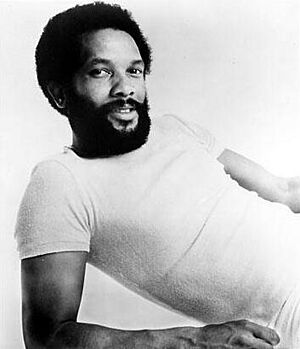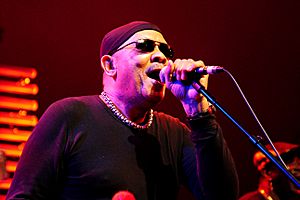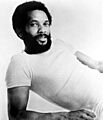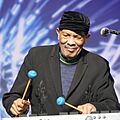Roy Ayers facts for kids
Quick facts for kids
Roy Ayers
|
|
|---|---|

Ayers in 1976
|
|
| Background information | |
| Birth name | Roy Edward Ayers Jr. |
| Born | September 10, 1940 Los Angeles, California, U.S. |
| Died | March 4, 2025 (aged 84) New York City, U.S. |
| Genres |
|
| Occupation(s) |
|
| Instruments |
|
| Years active | 1962–2023 |
| Labels | |
Roy Edward Ayers Jr. (born September 10, 1940 – died March 4, 2025) was an American musician. He was famous for playing the vibraphone, writing music, and producing records. Roy Ayers started his career playing post-bop jazz music. Later, in the 1970s, he helped create a new style called jazz-funk.
He was also very important in the acid jazz music scene. Many people called him "The Godfather of Neo Soul". Some of his most well-known songs include "Everybody Loves the Sunshine", "Running Away", and "Freaky Deaky". His music was often used by rappers, who would take parts of his songs to create new ones.
Contents
Early Life and Musical Beginnings
Roy Edward Ayers Jr. was born in Los Angeles, California, on September 10, 1940. He grew up in a family where music was very important. His father played the trombone, and his mother played the piano. When Roy was just five years old, he received his first vibraphone mallets from the famous musician Lionel Hampton.
The area where Roy grew up, called South Park (now part of South Central), was a lively center for Black music in Southern California. He went to Thomas Jefferson High School, which was a big part of the Central Avenue jazz scene. Many talented musicians, like Dexter Gordon, also went to this school. During his high school years, Roy sang in the church choir. He also led a band called the Latin Lyrics, where he played the steel guitar and piano.
Roy Ayers' Music Career
Starting Out in the 1960s
Roy Ayers began recording music in 1962. His first album, West Coast Vibes, came out in 1963. He worked with saxophonist Curtis Amy on this album. Roy became more widely known in 1966 when he joined the jazz flutist Herbie Mann's band.
Forming His Own Band
In the early 1970s, Roy Ayers started his own band called Roy Ayers Ubiquity. He chose the name "Ubiquity" because it means being everywhere at the same time. This name showed how he wanted his music to reach many people.
Roy Ayers created the popular music for the 1973 film Coffy. He also acted in the movie Idaho Transfer that same year. Later, his music style changed from jazz-funk to R&B. You can hear this change in his 1975 album Mystic Voyage. This album included songs like "Evolution" and the popular disco hit "Brother Green (The Disco King)". His 1976 album, Everybody Loves the Sunshine, also featured its famous title track.
In 1977, Roy Ayers produced an album for the group RAMP called Come into Knowledge. That same year, his song "Running Away" became a very big hit.
Hits and Collaborations
In late 1979, Roy Ayers had his only top ten song on Billboard's Hot Disco/Dance chart with "Don't Stop the Feeling". This song was also the first single from his 1980 album No Stranger to Love. The main song from that album was later used by singer Jill Scott in her 2000 song "Watching Me".
In the late 1970s, Roy Ayers toured Nigeria for six weeks with Fela Kuti. Fela Kuti was a famous musician from Africa who created Afrobeat music. In 1980, they released an album together called Music of Many Colors.
In 1981, Roy Ayers produced an album for singer Sylvia Striplin called Give Me Your Love. That same year, he released his own album, Africa, Center of the World. In 1982, he worked with Rick James on the album Throwin' Down. Roy Ayers played a vibraphone solo on the song "Dance Wit' Me". They were known to be good friends.
In 1984, he released the album In the Dark. This album featured the use of a LinnDrum, a popular instrument at the time. Roy Ayers also played a solo on Whitney Houston's song "Love Will Save the Day" in 1988.
Roy Ayers performed his music for millions of people around the world. He played in Japan, Australia, England, and other parts of Europe. He was known for making "feel-good" music in the 1970s. He once said, "I like that happy feeling all of the time, so that ingredient is still there. I try to generate that because it's the natural way I am." This happy feeling was present in all his music, whether it was funk, salsa, jazz, rock, soul, or hip-hop.
Later Career: 1990s to 2020s

In the 1990s, Roy Ayers continued to release music. In 1993, he played vibraphone on the album Guru's Jazzmatazz Vol. 1. The next year, he was part of the album Stolen Moments: Red Hot + Cool. This album helped raise money and awareness for the AIDS epidemic. Time magazine called it "Album of the Year".
In the 2000s and 2010s, Roy Ayers also explored house music. He worked with famous house music artists like Masters at Work. He also started two record labels, Uno Melodic and Gold Mink Records.

In 2004, Roy Ayers released Virgin Ubiquity: Unreleased recordings 1976–1981. This collection allowed fans to hear songs that had not been released before. He also worked with soul singer Erykah Badu on his 2004 album Mahogany Vibes.
Roy Ayers even hosted a pretend radio station called "Fusion FM" in the video game Grand Theft Auto IV (2008). In 2015, he played vibraphone on Tyler, the Creator's album Cherry Bomb. Roy Ayers continued to perform live concerts until 2023.
Personal Life and Legacy
Roy Ayers married his wife Argerie in the early 1970s. They had three children together. He also had a son named Nabil Ayers, who is a writer. His daughter, Ayana, helped manage his career in his later years.
Roy Ayers passed away in a hospital in Manhattan, New York, on March 4, 2025. He was 84 years old and had been ill for some time.
A documentary film about Roy Ayers and his influence on other artists was being made. It was later renamed "Roy Ayers Connection" to show all the people and things he was connected to through his music. The famous musician Pharrell Williams has said that Roy Ayers was one of his biggest musical heroes. Roy Ayers also received a Lifetime Achievement Award from the Congress of Racial Equality.
Images for kids
See also
 In Spanish: Roy Ayers para niños
In Spanish: Roy Ayers para niños
 | Audre Lorde |
 | John Berry Meachum |
 | Ferdinand Lee Barnett |




